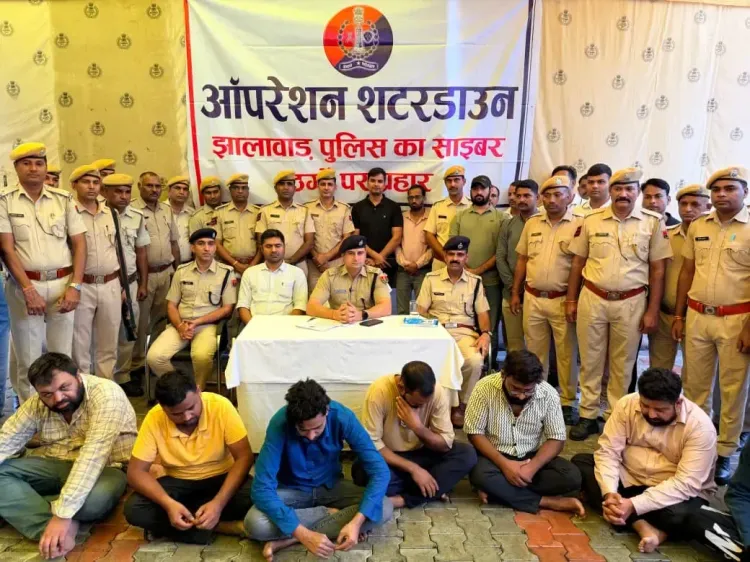How Did Rajasthan Police Uncover a Cyber Gang Behind Government Portal Breaches?

Synopsis
Key Takeaways
- Operation Shutdown leads to the arrest of six suspects.
- Authorities froze Rs 1 crore in suspicious accounts.
- Gang exploited loopholes in government welfare schemes.
- Over 17,000 beneficiaries affected by fraudulent activities.
- Ongoing investigations may lead to more arrests.
Jaipur, Oct 27 (NationPress) In a significant development, the Jhalawar Police in Rajasthan have dismantled an interstate cybercrime syndicate that successfully infiltrated various central and state government welfare platforms, including the PM Kisan Samman Nidhi, Jan Aadhaar, Raj SSP (Social Security Pension), and the Disaster Management Department’s DMIS portal.
Superintendent of Police Amit Kumar announced that the operation, dubbed “Operation Shutdown”, resulted in the apprehension of six suspects and the detention of two more across multiple locations, including Delhi, Punjab, and various districts in Rajasthan such as Jaipur, Bharatpur, Dausa, and Jodhpur. Authorities have also frozen Rs 1 crore across 11,000 dubious bank accounts affiliated with the gang.
SP Kumar stated that the group was engaged in extensive financial fraud amounting to crores by exploiting vulnerabilities in government welfare initiatives.
“This was a highly organized and interconnected interstate gang operating at both state and national levels,” he remarked.
During the course of the operation, initiated on October 22, police confiscated Rs 53 lakh in cash, note-counting machines, thousands of chequebooks, passbooks, and ATM cards, in addition to 35 laptops, 70 mobile phones, and data concerning over 11,000 bank accounts.
“Luxury vehicles, including cars, motorcycles, and tractors utilized by the suspects were also seized,” SP Kumar added.
Among those arrested is Mohammad Laiq (Jaipur), recognized as the State Nodal Operator for PM Kisan Samman Nidhi, accused of generating unauthorized IDs using his official credentials and conducting illegal land seeding for ineligible recipients.
“Subhash (Delhi) supplied land seeding information for fictitious beneficiaries in Uttarakhand and Uttar Pradesh. Mohammad Shahid Khan (Bharatpur), a former employee of the Land Development Bank, facilitated fraudulent activations. Rohit Kumar and Sandeep Sharma (Jalandhar, Punjab) created and managed clone websites mimicking government portals. Sunant Sharma has been identified as the primary handler of the gang,” he disclosed.
SP Kumar mentioned that two additional suspects, including Ramesh Chand (Phalodi Collectorate employee) and Bhag Chand (Dausa), were detained for enabling bulk registrations and enrolling the highest number of ineligible beneficiaries in Jhalawar district.
“The gang exploited dormant or inactive registrations of ineligible beneficiaries. Data gathered from rural agents was routed to operators like Laiq, who used official credentials to create unauthorized nodal IDs at night. These IDs allowed them to bypass OTPs and reactivate accounts for ineligible beneficiaries, siphoning government funds before deleting or disabling the login IDs by morning,” he outlined.
SP Kumar elaborated that on the DMIS portal, criminals took advantage of weaknesses in the Aadhaar Enabled Payment System (AePS).
“They accessed 1,500 SSO IDs and official emails—from collectorates to patwaris—to divert compensation funds intended for farmers into fraudulent accounts. Forensic examinations of seized devices revealed advanced cyber tools utilized to circumvent Aadhaar verification and gain access to e-Mitra Plus systems,” he explained.
He also indicated that police have recovered thousands of Pension Payment Orders (PPOs) and account information from social security programs.
“Suspicious fund transfers were identified for over 17,000 beneficiaries in Jaipur, Jodhpur, and Sikar, suggesting extensive data theft and manipulation. A six-member Special Task Force (STF) has been formed under Jhalawar Police, supported by cyber forensics units and intelligence agencies from multiple states to dismantle the network,” he confirmed.
SP Kumar noted that the investigation is ongoing, with further arrests anticipated as data analysis and inter-state collaboration progress.










